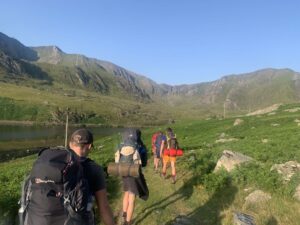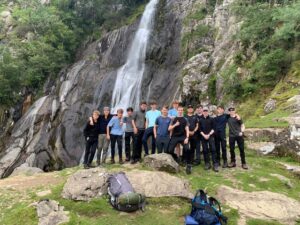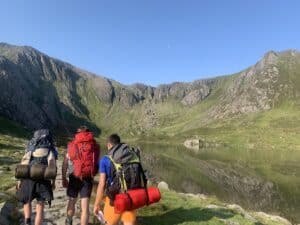Bronze Award
Between June (Year 9) and September a registration fee of £35 is payable via parentpay.com. Participants then receive a DofE handbook and access to a personal online account. A plan of activity is submitted to the programme manager which must be approved before activity can commence.
Arrangements for the expedition are issued after the October half term and take place during a weekend in May ( year 10) the following year. The date and cost of next year’s expedition is still to be confirmed, this year the cost was £150 but an increase is expected. Registration is open until the end of September, expedition recruitment will be completed by the end of December.
DofE Expeditions 2024/2025
A 2nd – 4th May 25 (Fri – Sun)
B 16th – 18th May 25 (Fri – Sun
C 23rd – 25th May 25 (Fri – Sun)
Silver Award
Between September (Year 11) and November a registration fee of £35 is payable via parentpay.com. Participants then receive a DofE handbook and access to a personal online account. A plan of activity is submitted to the programme manager which must be approved before activity can commence.
Arrangements for the expeditions are issued before the Christmas break and take place during weekends in June and September (year 12) the following year. The date and cost of next year’s expeditions are still to be confirmed, this year the cost was £290 but an increase is expected. Registration is open until the end of November, expedition recruitment will be completed by the end of January.
DofE Expeditions 2024/2025
Practice 27th – 29th June 25 (Fri – Sun)
Assessed 20th – 22nd September 25 (Sat – Mon)
Gold Award
Between September (Year 12) and November a registration fee of £40 is payable via parentpay.com. Participants then receive a DofE handbook and access to a personal online account. A plan of activity is submitted to the programme manager which must be approved before activity can commence.
Arrangements for the expeditions are issued before the Christmas break and take place during weekends in June and July the following year. The date and cost of next year’s expeditions are still to be confirmed, this year the cost was £400 but an increase is expected. Registration is open until the end of November, expedition recruitment will be completed by the end of January..
DofE Expeditions 2024/2025
Practice 21st – 23rd June 25 (Sat – Mon)
Assessed 11th – 14th July 25 (Fri – Mon)
A flavour of a DofE expedition
DofE Skill – Bronze
Cookery Programme (Skill)
We offer students the opportunity to attend a 6 week cookery skills course.
The programme will include food preparation and cooking skills as well as hygiene, health and safety, the course meets the requirements of the DofE Skill section.
The programme runs after school in the cookery suite on a Tuesday between 3:40pm – 5:40pm. The cost of a 6 week course is £42 per student. Students provide their own ingredients.
All Year 10 students who have signed up for the Bronze DofE award will be contacted in September and offered the opportunity to sign up to a Cookery Skills course.


f.a.q.
Hundreds of thousands of young people take part in The Duke of Edinburgh’s Award (DofE) each year – and you could be one of them. We help young people build lifelong belief in themselves, supporting them to take on their own challenges, follow their passions and discover talents they never knew they had.
The DofE is about you and your friends sharing amazing experiences together, having fun, and just maybe changing your futures along the way. Doing your Award helps to turn the things you love, and the things you’ve always wanted to try, into powerful lifelong skills that can help you get a job, change your community, and take on anything life throws your way. And yes, there’s going to be a bit of camping involved.
Taking part in a DofE journey will give you skills, confidence, and something to talk about when you apply for college, university or a job. Beyond your academic achievements, universities want to see evidence of “soft skills” that you have developed through extra-curricular activities, such as communication, commitment, leadership and teamwork. Your DofE Award is a fantastic way to demonstrate and evidence these skills in practice.
You’ll also make a difference to other people’s lives and your community, become fitter and healthier, make new friends and have memories to last you a lifetime. Our participants also tell us that doing their DofE supports their self-belief and resilience, can boost their mental health and wellbeing, and can help them face and overcome personal challenges.
– Bronze – for those aged 14+ years
– Silver – for those aged 15+ years
– Gold – for those aged 16+ years
If you aren’t 14 yet but are in the school year in which your peer group turn fourteen, you may be able to start a Bronze DofE programme – check with your DofE Leader.
Similarly, if you aren’t 15 yet, but are in the school year in which your peer group turn fifteen, you may be able to start a Silver DofE programme – check with your DofE Leader.
There are three levels of programme you can do which, when you’ve successfully completed them, lead to a Bronze, Silver or Gold Duke of Edinburgh’s Award. The main differences between them are the minimum length of time it takes to complete them, how challenging it is and the minimum age you can start.
Sectional activities need to average an hour a week, with the first and last activities being the full section duration apart. At Bronze level, it is typical for activities to be weekly. For longer sections at Silver and Gold (potentially at Bronze, depending on the activity), it can help for the activity to be longer (in terms of hours per session) but less often. This can be particularly good for the Volunteering section to allow participants to take on more interesting, challenging and responsible activities. For example, in a Gold programme lasting 12 or 18 months, a participant could do one longer session (e.g., 6 hours) of volunteering per month. Please note that activity cannot be condensed to less than one session per month.
For each section, you should set a challenging but achievable goal and be able to demonstrate development and regular progress towards this goal. All activities must be completed before your 25th birthday.
Depending on your age, you are free to start at any level, but most people prefer to start at Bronze and work upwards.
For each of your DofE sections, you need to choose an activity. Remember – you own your DofE programme and have the freedom to choose activities that are specific and relevant to you.
Not sure where to start? Read our seven handy tips below.
Want some inspiration? We’ve compiled a list of activities ideas for each section to inspire you. Or use it as a starting point to create your own bespoke DofE programme.
Don’t worry if you can’t find exactly what you want to do, speak to your Leader – most activities can count towards your DofE. All we ask is that any new activity is checked with your Licensed Organisation/DofE Leader to make sure it’s counted for the right section and that you’ve set yourself enough of a challenge.
An Assessor checks on your progress and agrees the completion of a section of your programme. They must be independent and over the age of 18. Therefore, they cannot be a member of your family.
An Assessor can be anyone who is interested in helping you to achieve, has some knowledge of the activity you are doing and can be available over the time you’re doing it. They will produce or sign off the relevant Assessor’s report for that section, which is uploaded into eDofE.
From the local football club coach to a charity shop manager, from the neighbour who’s a web designer to the conservation expert leading a residential week, just about anyone can be an Assessor for the Volunteering, Physical, Skills and Residential sections.
Because of the nature of expeditions, there are slightly different rules in place for Expedition Assessors.
If you are struggling to find Assessors, talk to your DofE Leader.
The Assessor should have knowledge of the activity being undertaken and be aware of your objectives. Give them the relevant sectional Assessor’s card from your Welcome Pack. The Assessor should also be available at key stages throughout your experience in order to assess your contribution and development.
Once a section is complete the Assessor will meet with you to discuss your performance, experiences and achievements.
The Assessor will also decide whether you have met the DofE requirements – that you’ve demonstrated effort, perseverance, improvement and made progress towards your section goals. This information, along with comments from the Assessor, should be recorded on the Assessor’s report which can be submitted online.
Even though we don’t encourage this, if necessary you may make one change of activity in each section at each level. You must restart the preparation, training, activity and assessment process and the time spent on both activities will add up to meet the overall time requirements for that section. Make sure you speak to your DofE Leader before starting a change of activity.
This list is a GUIDE to the items you may need when doing a DofE expedition. We only recommend items that are suitable for DofE expeditions and good value for money. There is no obligation to buy the specific items we recommend. However, the DofE charity receives a royalty from sales of DofE Recommended Kit which helps to support our work with young people. Remember, your DofE Expedition Supervisor will have the final say on the suitability of the kit required for your expedition. For more information read our free DofE Kit Guide at DofE.org/shop/dofeexpedition-kit-guide/ and visit DofE.org/shop/dofe-recommended-kit/
Respect. Protect. Enjoy.
With an ever-increasing number of young people choosing to do their DofE, we all have a responsibility to protect the countryside for other users and future generations. The Countryside Code is a standard set of guidelines for members of the public, to ensure respect and enjoyment in the countryside in the United Kingdom.
Read our Expedition Etiquette and the countryside code here.
Five ways to respect the Countryside Code
1. Leave gates as you find them
A farmer will normally close gates to keep farm animals in, but may sometimes leave them open so the animals can reach food and water. Leave gates as you find them or follow instructions on signs. Leaving a gate open if it was shut could let animals stray onto dangerous roads.
2. Leave no trace
Protecting the natural environment means taking special care not to damage, destroy or remove features such as rocks, plants and trees. They provide homes and food for wildlife, and add to everybody’s enjoyment of the countryside. Litter and leftover food doesn’t just spoil the beauty of the countryside, it can be dangerous to wildlife – so take your litter home with you, and help protect our environment by removing any other litter you see.
3. Respect livestock
Large farm animals can be daunting, but they are likely to be just as scared of you as you are of them! Keep to paths and pass animals calmly and quietly to avoid disturbing them – and please do not feed them.
4. Stick to the pathways
We are lucky to have free access to routes across farmland throughout the UK. Straying from official paths in these areas can damage the crops that farmers depend on for their living. Damaging crops costs farmers money and threatens the access to the countryside that many people enjoy. Stick to the paths provided. It’s worth remembering that each of the countries across the UK has its own rules, policies and rights of access and we should be familiar with these if we venture further afield.
5. Follow the signs
England has about 118,000 miles of public rights of way, providing many opportunities to enjoy the natural environment. Before you go on expedition get to know the signs and symbols used in to show paths and open countryside.
For more information please visit the Countryside Code website or the Northern Ireland Countryside Code website.









